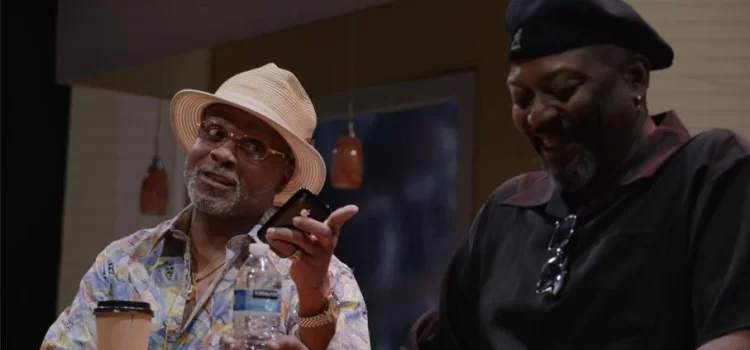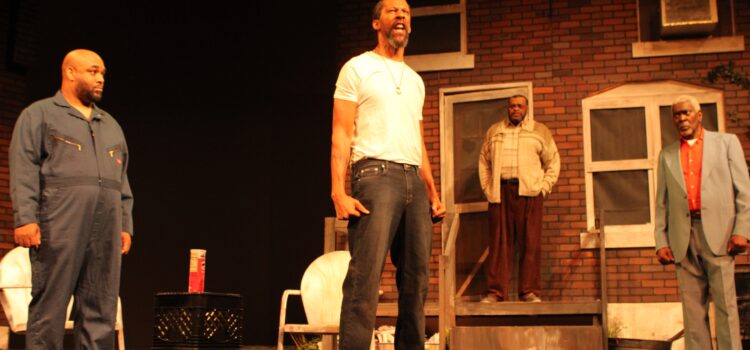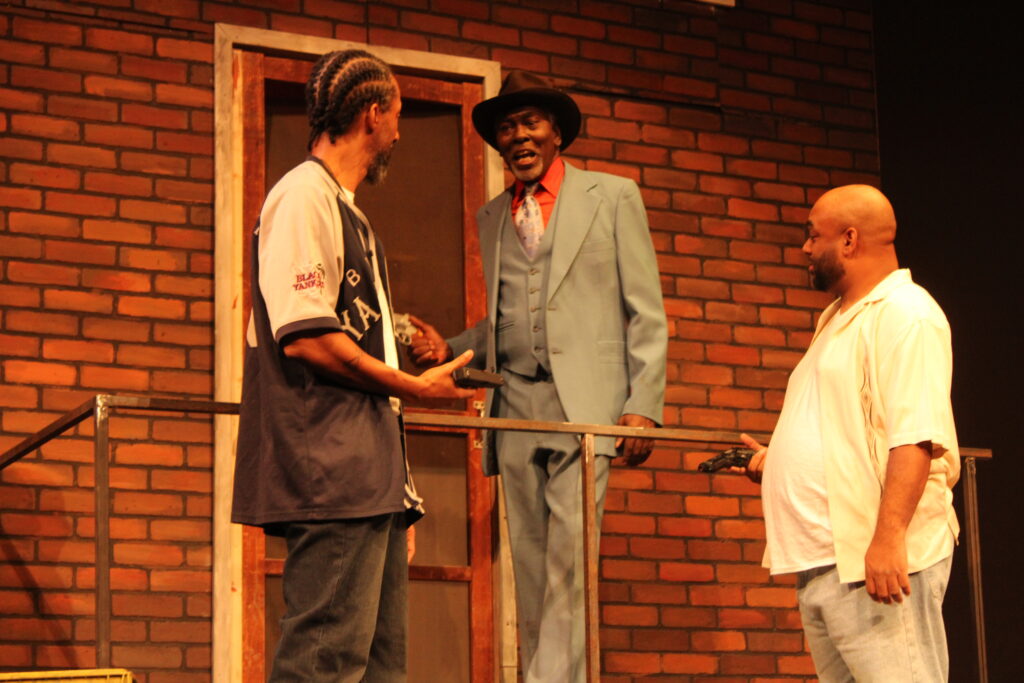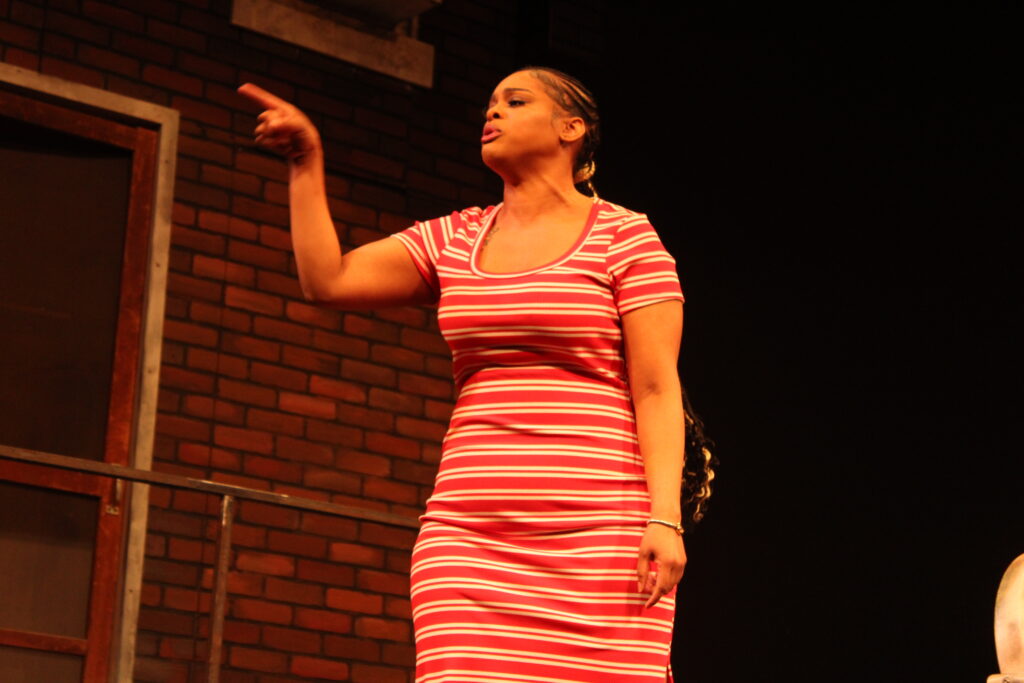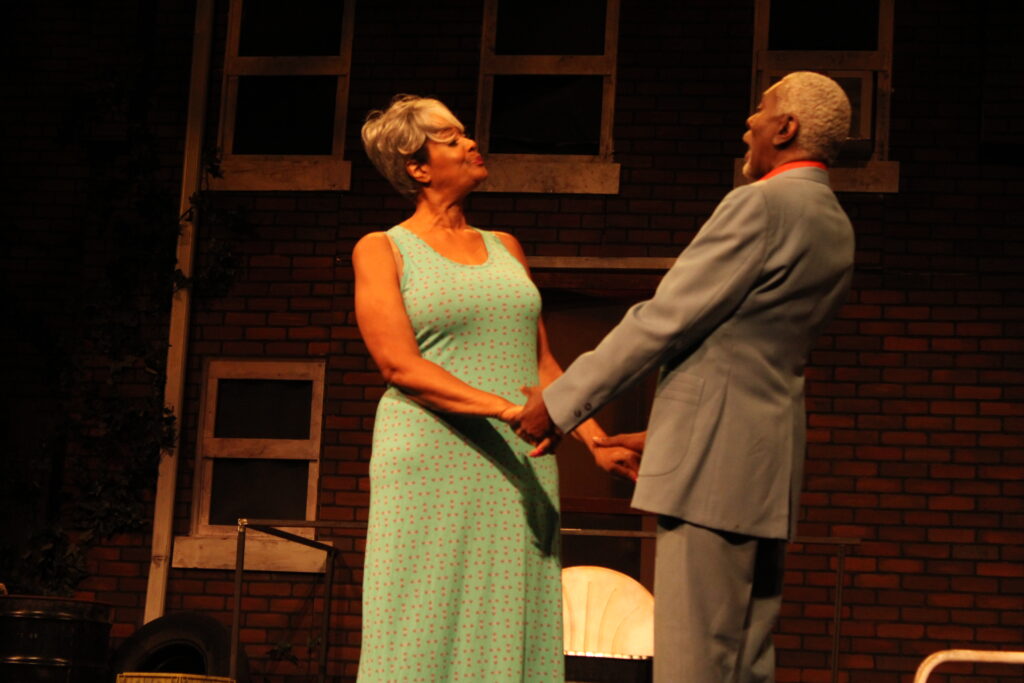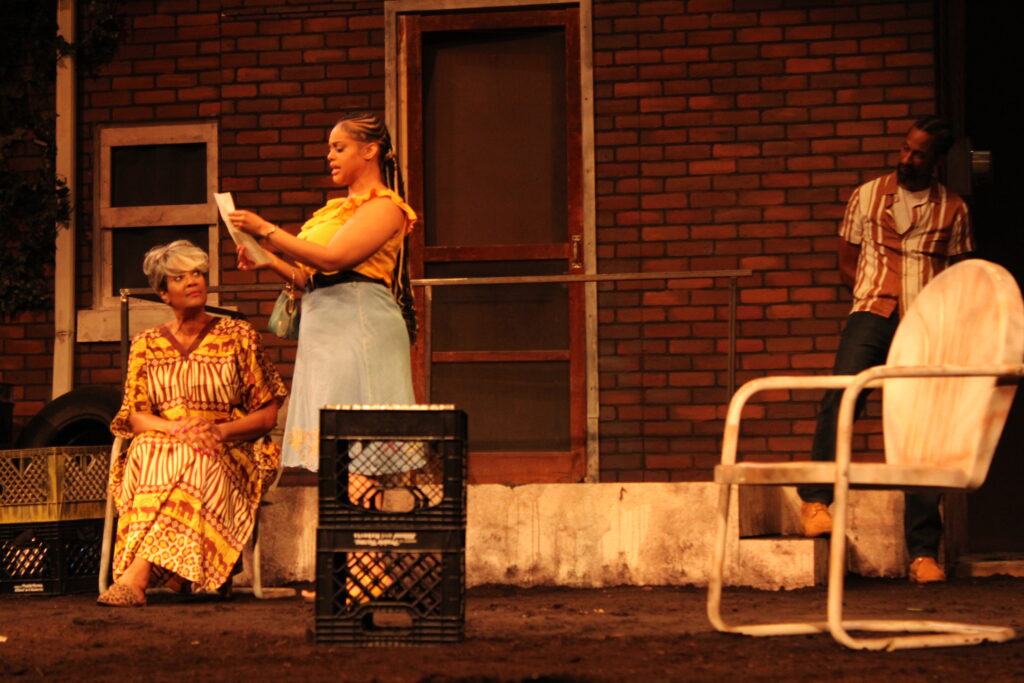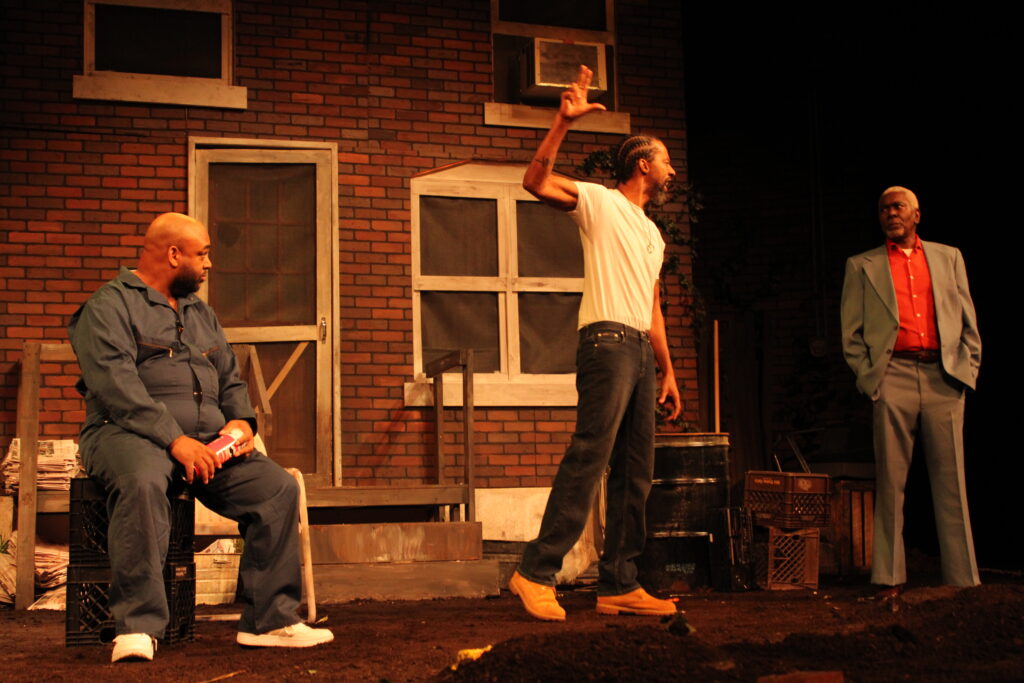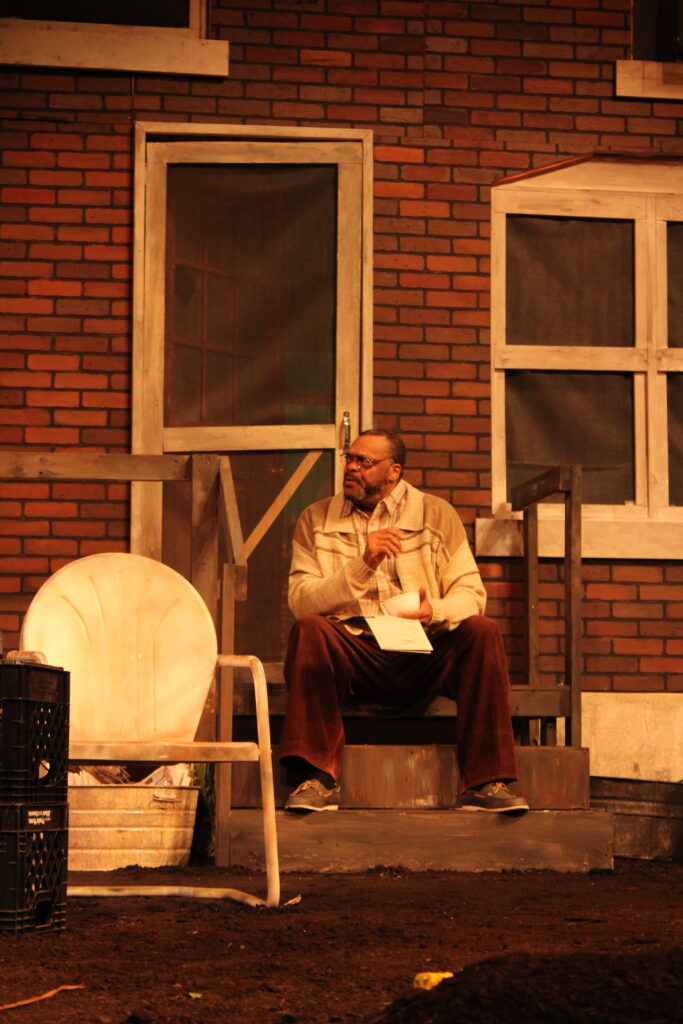By Lynn Venhaus
Four retired guys sitting around talking and drinking coffee at a Chicago McDonald’s is intriguing food for thought –a delectable slice-of-life scenario that immediately draws us in to the play “Coconut Cake.”
Playwright Melda Beaty’s flair for dialogue, humor and seamlessly integrating social commentary in her dramedy is irresistible in a compelling and thoughtful presentation in The Black Rep’s intimate A.E. Hotchner Studio Theatre at Washington University.
Because of the caliber of its five-male cast, this character-driven work makes a swift and memorable connection. Their nimble delivery and interactions under the skilled direction of Geovonday Jones enhances their personal relationships as their struggles are revealed over the course of the two-act 2-hour show.
As they explore issues of manhood, racism, mental health and offer advice over games of chess, they show genuine affection — and aggravation — with each other but offer convincing immersive characterizations and realistic camaraderie. It’s set in the summer of 2010.
A fifth character, an unhoused man they call Gotdamnit, interrupts their mornings asking for money and offering his philosophical and spiritual words of wisdom. He’s considered a pest, but there is a surprising backstory and as suspected, more to the guy than his appearance indicates. Lawrence Evans is riveting as a marginalized man.
While the women in their lives are discussed, not seen, vivid portraits of the female characters emerge as they factor into the men’s disparate demeanors. Two characters in particular – a classy, attractive woman that has caught their eye, whom they watch as she walks to work from the Mickey D’s window, and property owner Joe’s mysterious new tenant, Ms. Brulee, who is a baker that makes a divine coconut cake, which happens to be Eddie’s nostalgic childhood favorite.

Eddie Lee, a handyman, is the most agitated guy – upset about his wife’s escalating threatening behavior and discloses personal details about his troubled marriage. Everyone knows he has not been faithful, and that complicates matters. Duane Foster is strong as a guy whose life is falling apart but he’s not taking responsibility for the reasons why.
Marty is often the voice of reason, and his faith has kept him grounded. He’s a deacon in his church and devoted to his family, friends and congregation. As Marty, Richard E. Waits is firm, but measured, in the advice he gives, and it’s not always welcome.
The characters show different sides of them as husbands, fathers, sons and friends. Their individual stories mesh well, and the play offers unexpected twists and turns that add poignancy.
Each man has a significant emotional journey, and their textured portrayals give us richer story arcs as they bring up cherished memories and confide secrets.
Marty has brought along his brother-in-law Hank, a white guy who was married to his sister, who died a year ago. As played warmly by Joe Hanrahan, the widowed Hank is lonely and comes along for companionship and something to do. He’s learning chess, and he beams talking about his family, as his daughters and granddaughters try to keep him busy.
The outspoken Joe likes to needle Hank, calling him “Republican,” and increases his pot shots and cruel jabs. Richard Harris is a feisty live wire as the loud, swaggering Joe, a flashy blowhard who brags about his money and conquests. He’s never married but has a couple baby mamas.

As the very opinionated Joe, Harris can change his mood quickly. His accusations get heated and personal, especially if the other guys give him some lip about his boasts. His colorful wardrobe, often referred to as ‘fly’ in urban slang, is an indicator of his perceived status (kudos to costume designer Brandin Vaughn for the stylin’ attire).
Because Joe’s disposition can turn on a dime, his pointed barbs take on a hostile, accusatory tone in the second act, after he endures some setbacks.
All accomplished actors, the five bring nuance and shades of gray to our assumptions and give us deeper insight into these complicated men. They eventually must grapple with the consequences of their choices during their lifetimes.
Scenic designer Tammy Honesty has presented elements of a typical nook at a 2010-era McDonald’s, well-lit by designer Tony Anselmo, that allows Jones to move the action to wherever the guys are sitting.
When Joe struts in, he commands attention by seemingly holding court. Eddie is too restless to sit down most of the time, and Marty and Hank are often hunched over their chess board.

Sound designer Alan Phillips incorporated people chattering at times and assembled an appealing soundtrack of catchy pop hits. Christian Kitchens was an assured technical director, and Mikhail Lynn provided the minimal props.
This isn’t the first time The Black Rep has presented the play, because during the pandemic in September 2020, they made a virtual Zoom reading available from The Ensemble Theatre in Houston, which featured founder Ron Himes as a major character, Eddie Lee.
In 2022, Beaty received the second annual Sylvia Sprinkle-Hamlin Rolling Premiere Award by the International Black Theatre Festival. Because of that, this play is being produced by five theaters, including the Black Rep. It is a welcome return.
With its engaging cast, a captivating funny-sad bittersweet narrative, and noteworthy technical know-how, “Coconut Cake” is a satisfying production to savor.
(At intermission, a coconut cream cheese pound cake is available for purchase too, along with other snacks. Just sayin’, if you get a hankering for a sweet treat.)

The Black Rep presents “Coconut Cake” Feb. 5 – March 2 in the AE Hotchner Studio Theatre at Washington University. For tickets and more information, visit www.theblackrep.org

Lynn (Zipfel) Venhaus has had a continuous byline in St. Louis metro region publications since 1978. She writes features and news for Belleville News-Democrat and contributes to St. Louis magazine and other publications.
She is a Rotten Tomatoes-approved film critic, currently reviews films for Webster-Kirkwood Times and KTRS Radio, covers entertainment for PopLifeSTL.com and co-hosts podcast PopLifeSTL.com…Presents.
She is a member of Critics Choice Association, where she serves on the women’s and marketing committees; Alliance of Women Film Journalists; and on the board of the St. Louis Film Critics Association. She is a founding and board member of the St. Louis Theater Circle.
She is retired from teaching journalism/media as an adjunct college instructor.

